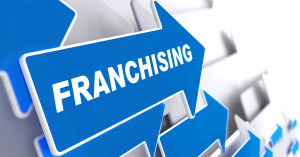Franchising benefits when executives are laid off in an economic downturn.
According to DeBolt, some executives start to think in terms of ‘How can I control my destiny? How can I take charge of things?’ And the costs of starting a business may be lower in a downturn, as labor tends to be cheaper. Good employees may also be easier to find.
People buy into a franchise because it may offer a lower risk than starting a business from scratch.
The buyer (the franchisee) pays a starting fee and ongoing royalties to the franchise owner (the franchiser). The franchisee then has the right to use the franchise trademark, gets support and advice from the franchiser and gains the right to use the franchiser’s business system and sell the franchised goods or services.
A franchise is likely to have lower start-up costs than an independent business, and a franchisee should benefit from following established and presumably successful strategies. A franchisee will have less room to show their own entrepreneurial flair, but they will also be less liable to the trial-and-error mistakes that businesses often make in their start-up phase.
A franchisee may also benefit from being part of a collective that buys materials, supplies and services. Collective muscle may help when negotiating things such as lease-terms and advertising. Collective knowledge can be circulated throughout a franchise operation, so that all members benefit from experiences, product development and improved marketing.
However, a franchise is not a license to print money. Buyers need to approach franchises skeptically, as franchisers inevitably present their business in a rosy light.
Some established franchises have not done particularly well in the current recession, while some newer operators have surged ahead. Prospective franchisees need to look for a concept that is recession-proof and that takes advantage of prevailing economic trends. They should also look for a business that will offer sustained quality and value.
The downside to buying a franchise is that the buyer is locked into a binding contract. They don’t have the control and decision-making opportunities that an independent business owner has. They may take advantage of the franchiser’s business experience, but they may also be locked into bad decisions by the franchiser.
Franchising offers positives from the franchiser’s viewpoint. Franchising may offer a way to expand without risking a lot of capital. And capital can be harder to secure in tough times. Banks, however, may be more inclined to support a franchise purchase. They may see it as a better bet than a business that has no track record.
A franchise operator with a successful brand and concept may simply keep on adding extra outlets.
“Ultimately, you can open many more units as franchises than you can as company-owned stores,” Steven Siegel told Entrepreneur.com. Siegel works for KaBloom, a Boston flower retailer with 34 franchise outlets. “Also, as you expand away from your headquarters, it gets more expensive to run the operation.”
The other advantage to running a franchise is that a franchise may well outperform a company-owned store.
“You can’t pay a manager enough to run the store as if it’s his own,” said Siegel, who estimated that franchises would typically outperform a company-owned store by 20 percent.
Investors also turn to franchising when the stock market offers lower returns. Franchises may offer stability and higher returns than shares. Some investors form groups and buy multiple franchise locations as a way of shifting their investments from a cooling stock market.
Internet resources include:
International Franchise Association
Canadian Franchise Association
Copyright 2003, RAN ONE Inc. All rights reserved. Reprinted with permission from www.ranone.com

 Chris’ combination of academic credentials, career experience and temperament ideally suit his calling as a business development advisor. Clients say he has a mind for business and a heart for service.
Chris’ combination of academic credentials, career experience and temperament ideally suit his calling as a business development advisor. Clients say he has a mind for business and a heart for service.